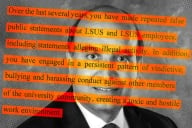You have /5 articles left.
Sign up for a free account or log in.
What exactly is a “snowflake”? It has become a catchphrase in the campus free speech debates, targeted mostly at students. A popular pejorative, it paints individuals as more likely to demand safe spaces than engagement when confronted with competing ideas.
It may befit many of those who use it, too. Conservatives are giving in to the same fragility of which they so freely accuse their liberal counterparts.
We are witnessing a narrative arc that every generation seems destined to relearn: over a long enough time horizon on any conflict, you find yourself indistinguishable from your opposition. Whatever invisible ideas and passions sent people racing into the ring, once there, many employ the same tactics and become the same cliché. Today, in the latest effort to change history by becoming its mirror, we need only look to conservative efforts to correct free speech on campuses by playing with the rule book.
The past year alone has seen conservative organizations creating “watch lists” to encourage harassment of faculty members accused of advancing “radical agendas in lecture halls” as well as Republican state lawmakers introducing bills to mandate screening of candidates for professorships based on their political affiliation and legislation to prevent faculty members from teaching certain topics.
Along similar lines, a model policy from the Goldwater Institute may be gaining traction to mandate punishments of student protesters, such as one-year suspensions or even expulsions for any student twice found responsible for “infringing the expressive rights of others.” Such an overly broad measure invites abuse. It also encourages micromanaging by legislators and severely limits university autonomy, which is essential for academic freedom -- another area that’s under assault.
This emerged in a recent decision by the University of Wisconsin system Board of Regents to adopt a policy closely modeled on that proposed by the Goldwater Institute, including the mandatory punishment provision. While boards of regents are better placed to make such specific decisions about university management than legislatures, this level of involvement in punishment by the board appears unprecedented in the UW system. Mandatory minimums that allow little room for discretion have been destructive to our criminal justice system, and we have little reason to think they are appropriate in the complicated environment of a college campus.
Though well intentioned, such efforts risk ultimately hurting the principles they aim to protect. While some high-profile protests of speakers do materially and substantially disrupt the speech of others -- such as the incident at Middlebury College in which a professor was injured -- such inflexible punishment policies, implemented by nervous administrators, would likely chill protected speech.
If the solution for tolerance is to reach and educate students on its vital importance, then insulting a large portion of them will probably hinder opportunities for engagement. While some students have reacted adversely to speech they disagree with, one must be careful not to paint all students with an overly broad brush. Most are looking to get an education, broaden their minds or move along in their careers. Many who are protesting are seeking to stand up for causes in which they deeply believe. Insulting their hard work and intelligence by calling them names like “snowflake” is not a productive way to move conversations on free speech forward.
Problems with free speech tend to arise from a campus culture that does not fully understand it or value it. Many colleges and universities would benefit from reviewing their speech policies and making public declarations, as the University of Chicago did, in support of free speech. Yet, beyond free speech, what is to be desired is a culture that fosters open and robust discussion of all views.
While the First Amendment is a critical bulwark, this tolerant culture cannot be achieved simply via laws and punishments. It must be nurtured and cultivated.








